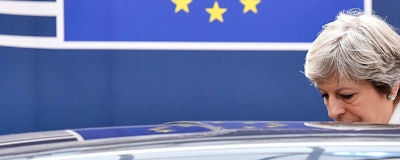
LONDON (AP) — Britain's biggest business groups called on the government Monday to quickly agree to a transition period of at least two years following the country's exit from the European Union to provide certainty about trade as companies make critical decisions about jobs and investment.
The letter sent to Brexit Secretary David Davis said the economic relationship between Britain and the EU should be "as close as possible to the status quo" during the transition.
"Agreement (on a transition) is needed as soon as possible, as companies are preparing to make serious decisions at the start of 2018, which will have consequences for jobs and investment in the U.K.," said the letter from the Confederation of British Industry, the British Chambers of Commerce, the manufacturing trade body EEF, the Institute of Directors and the Federation of Small Businesses.
Britain is due to leave the EU in March 2019, and Prime Minister Theresa May has requested a two-year transition period in which the two sides would trade on terms largely similar to current arrangements. After a European summit last week in Brussels, EU leaders insisted that Britain must make more concessions on a divorce payment before talks on trade and the transition can move forward. They did, however, agree to begin discussions among themselves about what the future relationship will look like.
French President Emmanuel Macron sounded a note of caution, saying the two sides are still "far from having reached the necessary financial commitments" that would allow the talks to move on to the second phase.
In a reflection of the tense mood, a high-level European Union official on Monday rejected an unfavorable news report about a dinner a week ago between May and European Commission President Jean-Claude Juncker where May sought to rally EU support for her views on the negotiations.
Juncker's chief aide, Martin Selmayr, denied an account of the dinner that claimed May was "begging for help" from the other 27 EU leaders. He also denied that the commission or Juncker had leaked the story to Germany's Frankfurter Allgemeine Sonntagszeitung newspaper.
The newspaper said Juncker told colleagues that "May's facial expressions and her appearance spoke volumes" and she appeared "despondent."
Selmayr said on his Twitter account: "I deny that 1/we leaked this; 2/Juncker ever said this; 3/we are punitive on Brexit." The story was an attempt to undermine the Brexit talks, he said.
European Commission spokesman Margaritis Schinas repeated the denial, saying "President Juncker would have never used the words attributed to him, and never would he have said anything like this. "We have never been punitive on Brexit. We have said, at all levels, on many occasions, that we are working for a fair deal."
May's official spokesman, James Slack, said he had "no comment whatsoever" on the leaked story.
He said the U.K. and the EU had jointly said after the Brussels summit that "the talks were constructive and friendly. I have nothing to add to that."
May has been in need of a boost from the 27 other EU leaders as she tries to hold together a government, a Conservative Party and a country deeply divided over Brexit.
An EU official said that, after last week's dinner, all the leaders are aware of the difficulties May is facing at home. The official, who spoke on condition of anonymity because the talks were confidential, said there was a sense among EU leaders that they didn't want to make life more difficult for May.
Juncker will have a first chance to comment on the fallout from the summit when he addresses the Institute of Political Studies in Strasbourg later Monday. He will also talk about the summit when he addresses the European parliament Tuesday morning.
___
Casert reported from Brussels. Jill Lawless in London contributed to this story.






















